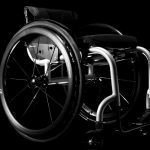Guest blog written by Ashley Taylor of www.disabledparents.org
Being a new parent is a time full of promise and anxiety; there is so much to hope for and worry about. If you have a disability, you likely have different challenges when it comes to preparing for a newborn. Here are some tips for readying yourself and your home for the new addition.
The best way to get over pre-parenting jitters is to prepare yourself and your home for the arrival, and then figure it out as you go along like everyone else does. As you and your baby get used to your new lives together, you’ll figure out what works for you in caring for him. In the meantime, you can childproof your home and maybe make some updates for yourself as well.
Childproofing
The first thing you’ll want to do is have someone get on the floor and crawl around like a baby to gauge any hazards at the crawling level. What enticing things might baby chew on or pull on top of himself? What furniture needs bumper guards or securing to the wall so that it doesn’t fall? What cabinets and drawers need locks? Use a checklist to go over any possible concerns.
Confirm Accessibility
Next, you’ll want to make sure everything that you have for baby is usable for you. If you’re in a wheelchair, consider adjustable changing tables, wheelchair-friendly cribs and sling baby carriers or specialized ones that attach to your wheelchair. Look for travel systems that work for you specifically, though be prepared to sift — the choices for these systems are myriad.
When going through your home, look for tripping hazards that might be problematic for you or an energetic toddler. Make sure that you have skid-resistant flooring to prevent slips and falls. If you use a wheelchair and have a ramp outside, you might consider installing one indoors wherever baby might go that you’ll need to follow. You’ll also want to make sure that your baby’s toys and daily necessities (diapers and wipes, for example) are easily within reach in every room. Baby won’t wait for you, so have supplies close at hand. It also helps to plan ahead so you never run out. Look into subscriptions for diapers and wipes delivery so you always have them on hand.
Extra Steps
Prepare for emergencies by putting a list with the number for Poison Control in or by every phone, along with emergency contact numbers for your pediatrician and any family members you might call for assistance.
Use night lights so that you can see when you have to get out of bed to check on baby and make sure there is nothing in the way that you might trip over. Make sure your smoke and carbon monoxide detector batteries are current and that you have a fire extinguisher in the kitchen. Put all cleaning supplies and medicines up out of baby’s reach or in a locked cabinet.
Check for resources for new parents in your local community and find a support group of other parents to help answer your questions. Ask for help from friends and family members who might take over so that you can get some adult time in, or a nap, or both. Remember that you can’t be a good caregiver for your baby if you’re burned out, so take advantage of all opportunities to be good to yourself.
Being a parent is difficult. Having a disability adds to the challenges of parenthood, but if you take care of accessibility needs, be sure you childproof, organize your baby supplies so they’re always within reach, and take a deep breath, you’ll be ready to jump in.






Recent Comments